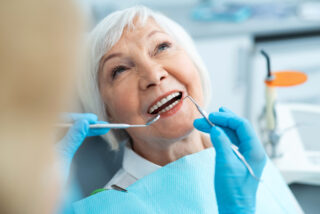
More Dental Health Articles
Dental Concerns For Older Adults

Today, Americans are retaining our natural teeth longer than ever before. Maintaining good oral hygiene is critically important as we age. When problems occur in the mouth, they can cause difficulty chewing, swallowing, speaking and smiling – basic functions which can affect both physical and social well-being.
What special dental issues do older people face – and what can be done about them?
A recent study found that nearly one-third of people over 65 had untreated dental caries (cavities). In older people, these are found not only in the crown (chewing surface) of the tooth, but also in the root, which may become exposed due to gum recession. Regular dental checkups are the best way to find and treat dental caries; left untreated, they can cause pain, require more complex procedures, and eventually lead to lost teeth.
Gum disease is another major oral health issue faced by older people – and it’s presently the leading cause of tooth loss in adults. The disease is caused by plaque bacteria, which thrive on the sticky biofilm that clings to the surface of teeth when they aren’t properly cleaned. Poor-fitting dentures can make the problem worse, as can the presence of certain diseases (such as diabetes or cancer).
Sometimes, decreased mobility (due to arthritis or similar conditions) makes routine brushing and flossing more difficult. Special brushes with larger grips and floss holders can help make daily cleaning easier; additionally, therapeutic mouth rinses may be prescribed. In-office treatments can also be effective in bringing gum disease under control.
Oral cancer is a concern at any age, but it’s seven times more likely to show up in a person over 65 – and it causes more deaths in older Americans than skin cancer does. Early detection offers the best chance at controlling the disease, and improves survival rates significantly. A thorough screening for oral cancer should be a part of every older person’s routine dental checkup.
Dry mouth (xerostomia) isn’t just an annoyance – it can be harmful to your oral health. Aside from its lubricating qualities, saliva contains beneficial digestive enzymes, acid neutralizers, and bacteria-fighting agents. A number of factors may cause the body to produce less saliva than normal – but in older adults, this problem is often due to side effects from prescription or over-the-counter medications. If you’re experiencing chronic dryness of the mouth, it’s sometimes possible to change your medication, and/or use products designed to relieve these symptoms.
Other Articles You May Find of Interest...
- The Importance of Phase I Orthodontic Treatment for Children Aged 8-10
- Retainers in Riverdale, NY: Choosing the Best Option for Your Smile
- Discover Top-Quality Dental Care in Rockford IL
- Pregnancy & Hormonal Gingivitis: An Essential Guide
- Straighten Your Teeth, Improve Your Health
- Dental Implants For Edentulous Patients
- Dental X-Rays Explained: Procedures, Uses, And Frequency

















